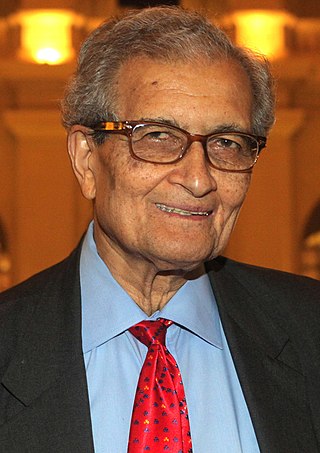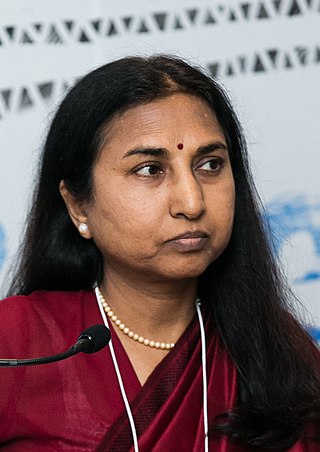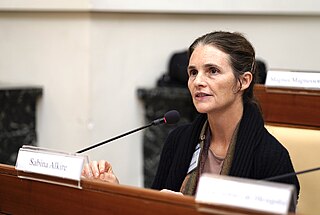
Amartya Kumar Sen is an Indian economist and philosopher, who has taught and worked in the United Kingdom and the United States since 1972. Sen has made contributions to welfare economics, social choice theory, economic and social justice, economic theories of famines, decision theory, development economics, public health, and measures of well-being of countries.

Feminist economics is the critical study of economics and economies, with a focus on gender-aware and inclusive economic inquiry and policy analysis. Feminist economic researchers include academics, activists, policy theorists, and practitioners. Much feminist economic research focuses on topics that have been neglected in the field, such as care work, intimate partner violence, or on economic theories which could be improved through better incorporation of gendered effects and interactions, such as between paid and unpaid sectors of economies. Other feminist scholars have engaged in new forms of data collection and measurement such as the Gender Empowerment Measure (GEM), and more gender-aware theories such as the capabilities approach. Feminist economics is oriented towards the goal of "enhancing the well-being of children, women, and men in local, national, and transnational communities."

Martha Craven Nussbaum is an American philosopher and the current Ernst Freund Distinguished Service Professor of Law and Ethics at the University of Chicago, where she is jointly appointed in the law school and the philosophy department. She has a particular interest in ancient Greek and Roman philosophy, political philosophy, existentialism, feminism, and ethics, including animal rights. She also holds associate appointments in classics, divinity, and political science, is a member of the Committee on Southern Asian Studies, and a board member of the Human Rights Program. She previously taught at Harvard and Brown.
Philosophy and economics studies topics such as public economics, behavioural economics, rationality, justice, history of economic thought, rational choice, the appraisal of economic outcomes, institutions and processes, the status of highly idealized economic models, the ontology of economic phenomena and the possibilities of acquiring knowledge of them.
Social choice theory or social choice is a theoretical framework for analysis of combining individual opinions, preferences, interests, or welfares to reach a collective decision or social welfare in some sense. Whereas choice theory is concerned with individuals making choices based on their preferences, social choice theory is concerned with how to translate the preferences of individuals into the preferences of a group. A non-theoretical example of a collective decision is enacting a law or set of laws under a constitution. Another example is voting, where individual preferences over candidates are collected to elect a person that best represents the group's preferences.

Harry Brighouse is a British political philosopher at the University of Wisconsin–Madison. His research interests include the relationship between education and liberalism. His work on this topic has been widely cited by broadsheet newspapers, such as The Independent, and The Guardian.

The capability approach is a normative approach to human welfare that concentrates on the actual capability of persons to achieve lives they value rather than solely having a right or freedom to do so. It was conceived in the 1980s as an alternative approach to welfare economics.

Bina Agarwal is an Indian development economist and Professor of Development Economics and Environment at the Global Development Institute at The University of Manchester. She has written extensively on land, livelihoods and property rights; environment and development; the political economy of gender; poverty and inequality; legal change; and agriculture and technological transformation.
Martin Vinzenz Baldur Paul Maria (Martin) van Hees is a Dutch philosopher.
The Human Development and Capability Association (HDCA) was launched in September 2004 at the Fourth Capability Conference in Pavia, Italy. It was founded to promote research from many disciplines on key problems including poverty, justice, well-being, and economics.
Katherine Jane Humphries, CBE FBA, is a Fellow of All Souls College, University of Oxford with the Title of Distinction of professor of economic history. Her research interest has been in economic growth and development and the industrial revolution. She is the former president of the Economic History Society and the current vice-president of the Economic History Association.

Elizabeth Secor Anderson is an American philosopher. She is Arthur F. Thurnau Professor and John Dewey Distinguished University Professor of Philosophy and Women's Studies at the University of Michigan and specializes in political philosophy, ethics, and feminist philosophy.

Stefano Zamagni is an Italian economist. Born in Rimini, Zamagni is Professor of Economics at the University of Bologna. Zamagni is also a fellow of the Human Development and Capability Association and President of the Pontifical Academy of Social Sciences.

Sabina Alkire is an American academic and Anglican priest, who is the director of the Oxford Poverty and Human Development Initiative (OPHI), an economic research centre within the Oxford Department of International Development at the University of Oxford, England, which was established in 2007. She is a fellow of the Human Development and Capability Association. She has worked with organizations such as the Commission on the Measurement of Economic Performance and Social Progress, the United Nations Human Development Programme Human Development Report Office, the European Commission, and the UK's Department for International Development.
David A. Crocker, is Research Professor in the School of Public Policy, at the University of Maryland, he is also the founder and former president of the International Development Ethics Association (IDEA). His work has been cited by the United Nations Human Development Report.
Séverine Marie Paule Deneulin is a senior lecturer in International Development at the Department of Social and Policy Sciences, University of Bath, and a fellow of the Human Development and Capability Association (HDCA); she is also the HDCA's secretary with a place on the executive council.
Limitarianism refers to several different types of ethical theories. Though Limitarianism applies differently to varied fields of study, what is always common is an examination of when it is proper, moral or ethical to interfere and intervene in the lives and freedoms of individuals, in order to benefit society as a whole. It sometimes presents as a principle of distributive justice in economic theories. Unlike encompassing systems of political and economic intervention, which seek to make dramatic changes to the social order, Limitarianism deals with specific instances and subjects, for which the necessity and justification of intervention may be examined. As its name implies, Limitarianism asks the question of how setting certain limits for human beings can lead to positive outcomes.
List of works by or about Martha Nussbaum, American philosopher.
Creating Capabilities is a book, first published by economist Martha Nussbaum in 2011, which outlines a unique theory regarding the Capability approach or the Human development approach. Nussbaum draws on theories of other notable advocates of the Capability approach like Amartya Sen, but makes specific distinctions. One distinct idea she proposes is to choose a list of capabilities based on some aspects of John Rawls' concept of "central human capabilities." These ten capabilities encompass everything Nussbaum considers essential to living a life that one values. Martha Nussbaum and Amartya Sen are considered to be the main scholars of this approach, but have distinctions in their approach to capabilities. Sen disagrees with Nussbaum's list of values on the grounds that it does not fully encompass the range of capabilities one would consider to live a fulfilling life, which inherently differs by person.









